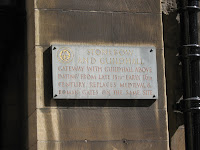Steeped in History although it does not go back a long way, 1821, to be exact.
It is set amidst pine woods and is Edwardian in character with the house portraying the vintage look.
The whole area was based on one mans dream, John Parkinson.
His ambition was to open a coal mine, but instead found a water spa, hence the name.
An architect named Richard Adolphus Came had grand designs for Woodhall Spa and its baths (which are now semi-derelict) and did not want any roads to be called streets, this policy is still maintained today.
Woodhall Spa has several aviation heritage sites and is associated with 617 Squadron, The famous Dambusters.
The railway line that goes through here to Horncastle was closed in 1970 and this was the next section of our route.
We continued on the railway line and stayed in Horncastle, another remarkable place and considerably older than Woodhall Spa.
It was nice to have a flat route to finish!
Horncastle dates back to 13th century when it was given its charter.
It used to be famous for its great August Horse fair until the early 20th century.
It is now more noted for its antiques trade, of which I had enormous fun looking round! Though Willow was not impressed with my window shopping!
Horncastle was also known as Banovallum (wall on River Bain) it was named so by the Romans, but it was later that it helped during the Battle of Winceby in 1643.
Winceby is about 4 miles east of Horncastle and worthy of a look around.
During the battle of 1643 it helped secure Lincolnshire for Parliament, Cromwell was almost killed here.
There is also a local legend in which it is reported that 13 scythe blades, which hang on the south wall of the chapel of St. Mary`s church, were used as weapons at Winceby.
The next part of the journey would take us off the beaten track from the comfort of the railway lines and back through farmers fields, passing old run down and derelict windmills.


The signposts that depict the viking way are nearly at every turn, which is very good.
Like the South West Coast Path, it is clearly marked.
The Viking Way is obviously called it for a reason - right? Yep, Vikings did descend onto the Humber and then down to Rutland Water, how different it would have looked!
We are actually doing the route the other way round, but it doesn`t make any difference, it is still as enjoyable!
Next day, we headed further north and found a change in the weather, it was no longer sunny, but cloudy and cooler.
Going through the fields the terrain was changing too, a few hills here and there, but it was still farmland with different styles to negotiate, but the places we passed appeared old and sedate, like Fulletby and Belchford, not a windy place I may add! But they seemed places of hidden time zones, still lingering in the past but with modern day cons like the car and satellite dishes displayed on the sides of the houses.
I soon decided that modern technology may be of some benefit but it aint arf ugly to look at!
We found a good campsite to stay at for the night in Goulceby.
Goulceby is not far from Market stainton and I wasn`t far from the finish line.
From Goulceby our route began to get a little more hectic with main roads beginning to join us.
It took nearly all day to get to Caistor, which was our next big stopping off point and although we could have detoured and stayed at Market Rasen, I decided to leave that for next time!
It wasn`t as though the journey was arduous, but it was pleasant and again dull but some days would take longer to walk than others.
Caistor was originally a Roman fortress and some 4th century walls still remain as a southern boundary, which is visible at the church of St. Peter and St. Paul.
Enclosed within the fortress is an Anglo - Saxon tower.
The rest of Caistor is now an old Georgian Town and the market square is made up of some 56 buildings all now grade II listed buildings.
Our Last day on the Viking Way would prove to be an awkward one, as the majority of the route runs alongside the A15 before going over it and crossing theM180 (albeit safely!) and then headed into Barton-Upon-Humber, but the weather was the final straw, it hammered it down and the sky was a dark grey and refused to leave, but we had finished and a good walk accomplished.





















































